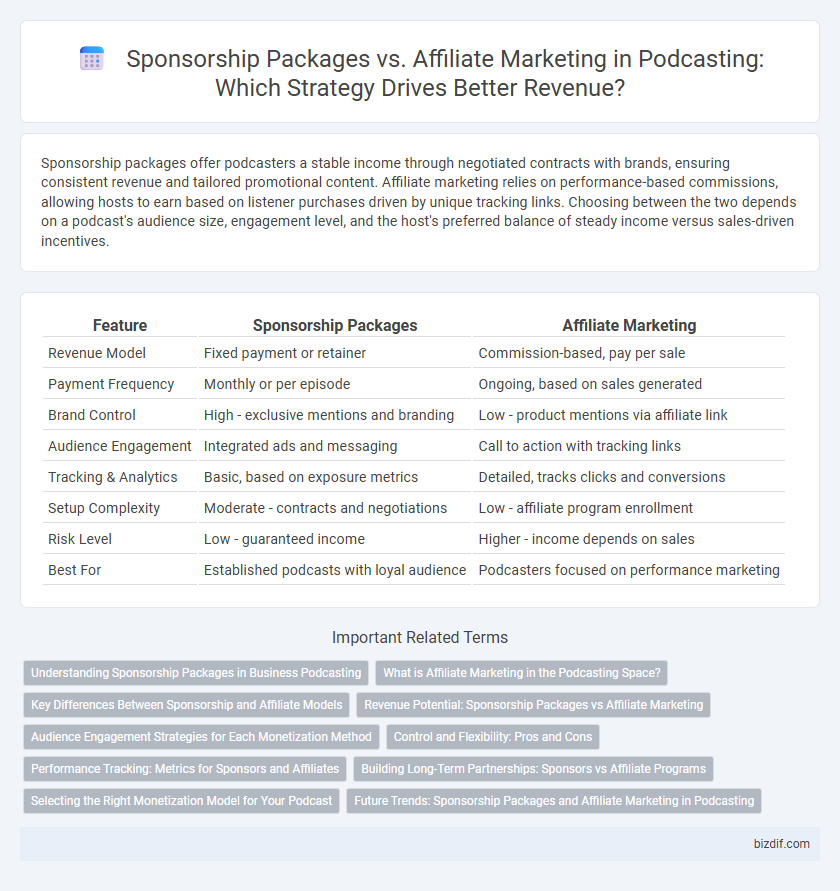Sponsorship packages offer podcasters a stable income through negotiated contracts with brands, ensuring consistent revenue and tailored promotional content. Affiliate marketing relies on performance-based commissions, allowing hosts to earn based on listener purchases driven by unique tracking links. Choosing between the two depends on a podcast's audience size, engagement level, and the host's preferred balance of steady income versus sales-driven incentives.
Table of Comparison
| Feature | Sponsorship Packages | Affiliate Marketing |
|---|---|---|
| Revenue Model | Fixed payment or retainer | Commission-based, pay per sale |
| Payment Frequency | Monthly or per episode | Ongoing, based on sales generated |
| Brand Control | High - exclusive mentions and branding | Low - product mentions via affiliate link |
| Audience Engagement | Integrated ads and messaging | Call to action with tracking links |
| Tracking & Analytics | Basic, based on exposure metrics | Detailed, tracks clicks and conversions |
| Setup Complexity | Moderate - contracts and negotiations | Low - affiliate program enrollment |
| Risk Level | Low - guaranteed income | Higher - income depends on sales |
| Best For | Established podcasts with loyal audience | Podcasters focused on performance marketing |
Understanding Sponsorship Packages in Business Podcasting
Sponsorship packages in business podcasting offer structured advertising opportunities with defined deliverables, such as host-read ads, episode mentions, and branded content integration, tailored to align with a sponsor's marketing goals. These packages provide predictable revenue streams and brand visibility through direct association with podcast content, often including multi-episode commitments and performance metrics. Unlike affiliate marketing, sponsorship packages emphasize long-term partnerships and customized messaging designed to enhance brand authority within the podcast's niche audience.
What is Affiliate Marketing in the Podcasting Space?
Affiliate marketing in the podcasting space involves podcasters promoting products or services and earning commissions based on listener purchases generated through unique tracking links. This performance-based model allows podcasters to monetize their audience by integrating authentic endorsements within their content. Compared to sponsorship packages, affiliate marketing offers flexible opportunities with revenue tied directly to listener engagement and conversion rates.
Key Differences Between Sponsorship and Affiliate Models
Sponsorship packages in podcasting involve a fixed payment for brand mentions or ad placements, providing stable revenue and clear deliverables. Affiliate marketing operates on a performance-based model where podcasters earn commissions from sales or leads generated through unique referral links. Key differences include payment structure, revenue predictability, and the level of audience engagement tied directly to conversion tracking in affiliate marketing.
Revenue Potential: Sponsorship Packages vs Affiliate Marketing
Sponsorship packages often generate higher and more predictable revenue streams for podcasters by offering fixed payments or tiered pricing based on audience size and engagement metrics. Affiliate marketing revenue fluctuates according to listener conversion rates and product appeal, making it less stable but potentially lucrative with high-performing campaigns. Analyzing audience demographics and behavioral data can optimize the balance between sponsorship deals and affiliate partnerships to maximize overall podcast income.
Audience Engagement Strategies for Each Monetization Method
Sponsorship packages in podcasting often involve tailored ad segments that align closely with the show's content, fostering higher audience engagement through authentic storytelling and brand integration. Affiliate marketing leverages personalized product recommendations and exclusive discount codes, encouraging listeners to take immediate action while tracking conversion rates. Each method optimizes audience interaction by balancing trust and value, with sponsorships emphasizing narrative immersion and affiliate marketing capitalizing on direct listener incentives.
Control and Flexibility: Pros and Cons
Sponsorship packages provide podcasters with greater control over brand alignment and content integration, allowing tailored messaging that fits the show's tone and audience. Affiliate marketing offers flexibility by enabling podcasters to promote multiple products without long-term commitments, but it may result in less cohesive content and limited control over advertiser requirements. Choosing between these monetization strategies depends on a podcaster's priority for consistent brand partnerships versus adaptable promotional opportunities.
Performance Tracking: Metrics for Sponsors and Affiliates
Sponsorship packages typically offer brands fixed placements with measurable key performance indicators such as impressions, reach, and listener demographics, providing clear metrics for evaluating brand exposure and audience engagement. Affiliate marketing focuses on direct performance metrics like click-through rates, conversion rates, and revenue generated, allowing precise tracking of influencer-driven sales. Effective performance tracking tools for both models include unique promo codes, UTM parameters, and attribution software, ensuring sponsors and affiliates can accurately assess campaign ROI and optimize strategies.
Building Long-Term Partnerships: Sponsors vs Affiliate Programs
Sponsorship packages in podcasting create long-term partnerships by offering brands consistent exposure through tailored content integration, fostering deeper audience trust and loyalty. Affiliate marketing programs provide performance-based relationships that drive immediate sales but often lack sustained brand presence and emotional connection. Prioritizing sponsorships helps podcasters develop ongoing collaborations that enhance revenue stability and brand alignment over time.
Selecting the Right Monetization Model for Your Podcast
Selecting the right monetization model for your podcast requires evaluating sponsorship packages and affiliate marketing based on audience size, niche relevance, and engagement rates. Sponsorship packages offer guaranteed revenue and brand partnerships tailored to your show's content, while affiliate marketing provides performance-based earnings through commissions on sales driven by your podcast listeners. Balancing these models according to your podcast's demographic insights and long-term growth goals maximizes both income and audience trust.
Future Trends: Sponsorship Packages and Affiliate Marketing in Podcasting
Sponsorship packages in podcasting are evolving with customizable ad placements and data-driven audience targeting, enhancing ROI for brands. Affiliate marketing is growing through seamless integration and performance-based compensation, driving higher listener engagement and conversion rates. Future trends indicate a hybrid approach combining sponsorship stability with affiliate marketing's scalability to maximize monetization opportunities.
Sponsorship Packages vs Affiliate Marketing Infographic

 bizdif.com
bizdif.com